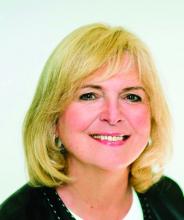LOS ANGELES – results from a cross-sectional study have shown.
“Thyroid disease is often associated with impaired quality of life and psychological well-being,” lead study author Anette Merke, MD, MS, said in an interview in advance of the annual scientific and clinical congress of the American Association of Clinical Endocrinologists. “In daily practice, anxiety and depression complaints are common in patients with thyroid dysfunctions. While depressive symptoms are often associated with hypothyroidism, anxiety is claimed to be mainly linked to hyperthyroidism. Data on euthyroid patients with thyroid disease are controversial. Some studies point out that autoimmunity itself contributes to psychosomatic malfunctions. Overall, the mechanisms underlying the interaction between thyroid dysfunction and neuropsychiatric processes are still unknown.”
Dr. Merke, of the Thyroid Center Bergstrasse in Bensheim, Germany, and her husband/coauthor Jüergen Merke, MD, PhD, used the self-administered German version of the validated Hospital Anxiety and Depression Scale (HADS-D) to perform a cross-sectional study of 215 euthyroid adults with thyroid disease between January and February of 2019. Of the 14 items on the measure, half relate to anxiety and the other half to depression. Each item on the HADS-D is scored from 0-3, and a score of 10 or higher is considered a positive case of anxiety or depression. Patients completed the HADS-D within 3 months of routine lab testing, and the researchers collected the patients’ demographic data after they had assessed the individual scores.
Of the 215 study participants, most (89%) were women, the mean age was 47 years, and the mean anxiety and depression scores were 6.68 and 4.68, respectively (P = .0001). There was no significant difference in severity with respect to anxiety or depression. Of the 70 patients (33%) with antibody-positive Hashimoto’s thyroiditis, the mean anxiety and depression scores were 7.26 and 4.17.
In patients with HADS-D scores of 10 or greater, 50 (23%) had prominent anxiety scores (mean, 12.4), whereas 22 (10%) had prominent depression scores (mean, 13.18). Among the subset of Hashimoto’s thyroiditis patients, 18 (26%) had a mean anxiety score of 12.6 and 8 (11%) had a mean depression score of 13.18. Overall, significantly more cases were found in those who met criteria for anxiety, compared with those who met criteria for depression (P = .0001), with no significant difference in severity of either condition.
Depressive symptoms are usually more closely associated with thyroid disease, and there are more studies that have examined that relationship, so “we were surprised to find no significant difference in depressive symptoms between our study cohort and the German general population,” Dr. Merke said. “We were also surprised that anxiety had a significantly higher incidence in the cohort.”
The findings suggest that clinicians should focus on signs of anxiety symptoms when dealing with euthyroid patients with thyroid disease who report psychosomatic impairments, she continued, especially when patients complain of not being able to relax and release somatic tension.
“According to HADS, fears and worries are an expression of anxiety, and not of depression,” Dr. Merke said. “With this in mind, doctors [should] actively ask [about] the above-mentioned symptoms and advise patients to learn relaxation techniques to improve their quality of life. Interdisciplinary collaboration is needed between clinicians and psychotherapeutic professionals for the sake of the patients and to evaluate a cause-and-effect relationship and potential risk factors for development of psychosomatic cofactors in thyroid and other chronic somatic diseases. We should all be aware that misinterpretation or even denial of psychosomatic complaints may lead to complications and even a higher mortality of somatic diseases, as shown for chronic heart failure. This could also be true for thyroid disease.”
Dr Merke acknowledged certain limitations of the study, including the fact that neither the duration of thyroid disease nor the use of specific thyroid medications was assessed. In addition, “the definition of euthyroidism in our study is somewhat broad, especially compared with the recommendations of the [American Association of Clinical Endocrinologists],” she said. “Division of the respective thyroid hormone status into quartiles may be helpful to indicate the critical thyroid hormone serum concentration, which may be associated with clinically relevant anxiety symptoms in euthyroid patients.”
Dr. Merke reported having no financial disclosures or conflict of interest.

